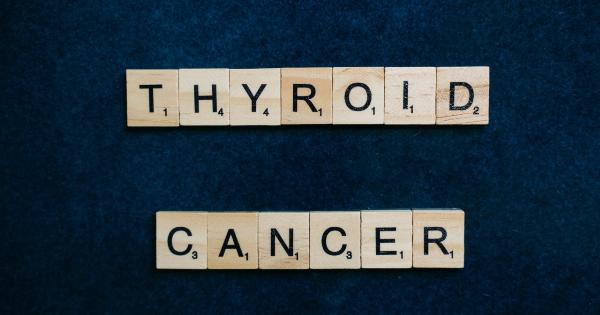Thyroid Cancer is a condition that develops when abnormal cells begin to grow and multiply in the thyroid gland.
The thyroid gland is located below your Adam’s apple and is responsible for producing hormones that regulate your heart rate, body temperature, and metabolism. While thyroid cancer is a relatively rare form of cancer, it is still important to understand its symptoms, causes, and treatment options to improve your chances of early detection and successful treatment.
Types of Thyroid Cancer
There are four main types of thyroid cancer:.
- Papillary thyroid cancer
- Follicular thyroid cancer
- Medullary thyroid cancer
- Anaplastic thyroid cancer
The most common type of thyroid cancer is papillary thyroid cancer, which accounts for about 80% of all cases.
Follicular thyroid cancer is the second most common type, accounting for about 10% of cases, while medullary thyroid cancer and anaplastic thyroid cancer are rare but more aggressive forms of thyroid cancer.
Causes of Thyroid Cancer
While the exact causes of thyroid cancer are unknown, several factors can increase your risk of developing the condition:.
- Family history of thyroid cancer
- Exposure to radiation, especially during childhood
- Having a thyroid condition, such as an enlarged thyroid or thyroid nodules
- Gender (women are three times more likely than men to develop thyroid cancer)
- Age (thyroid cancer is more common in people over 60 years old)
Symptoms of Thyroid Cancer
In the early stages of thyroid cancer, there may be no visible symptoms. However, as the cancer grows, you may experience one or more of the following symptoms:.
- A lump or swelling in the neck
- Difficulty swallowing or breathing
- Hoarseness or changes in your voice
- Pain in the neck or throat
- Swollen lymph nodes
It’s important to note that these symptoms can be caused by many conditions other than thyroid cancer. If you experience any of these symptoms, consult your doctor for an accurate diagnosis.
Diagnosis of Thyroid Cancer
If your doctor suspects thyroid cancer, they may perform one or more of the following tests to diagnose the condition:.
- Physical exam: Your doctor will examine your neck for any lumps or swelling
- Blood tests: These tests can detect abnormal levels of thyroid hormones or other substances in the blood that may indicate cancer.
- Ultrasound: This imaging test uses sound waves to create pictures of the thyroid gland and can help detect any abnormalities or nodules.
- Fine-needle aspiration biopsy: A small sample of thyroid tissue is removed with a needle and examined under a microscope to check for cancer cells.
Treatment of Thyroid Cancer
Treatment for thyroid cancer depends on the type and stage of cancer, as well as your overall health. The main treatment options for thyroid cancer include:.
- Surgery: The most common treatment for thyroid cancer is surgery to remove all or part of the thyroid gland.
- Radioactive iodine therapy: This treatment is used to destroy any remaining cancer cells or thyroid tissue after surgery.
- External radiation therapy: This treatment uses high-energy radiation to kill cancer cells.
- Chemotherapy: This treatment uses drugs to kill cancer cells.
Your doctor will discuss the best treatment options for your individual case.
Prevention of Thyroid Cancer
While there is no sure way to prevent thyroid cancer, there are some things you can do to reduce your risk of developing the condition:.
- Avoid exposure to radiation, especially during childhood
- Get regular check-ups with your doctor to monitor any thyroid abnormalities or nodules
- Eat a healthy diet that is rich in fruits, vegetables, and whole grains
- Don’t smoke
Conclusion
Thyroid cancer is a rare but serious condition that requires prompt diagnosis and treatment.
By understanding the types, causes, symptoms, diagnosis, and treatment options of thyroid cancer, you can take steps to ensure early detection and successful treatment. If you experience any symptoms of thyroid cancer, consult your doctor for an accurate diagnosis and treatment plan.





























